How to Make Your Money in Yakuza: Like a Dragon's Business Mode
Go from rags to riches with some proper management.
Yakuza has had some pretty surprisingly in-depth minigames over the years. Past entries have had real-estate acquisitions and cabaret club management, and Yakuza: Like a Dragon is no different, This time, though, the focus is on building a portfolio of various Yokohama properties, collected under one financial entity.
Early on in the story, Kasuga Ichiban will stumble backwards into becoming the new head of a company called Ichiban Confections (no relation). Once the diamond of Yokohama's financial scene, the company has been dramatically downsized to just its single, lonesome sweets shop.
Ichiban steps in to bring the Confections company back to its former glory, which launches one of the game's largest minigames, the business management sim. In it, you buy, sell, and upgrade various properties around Yokohama, ranging from restaurants and arcades to security firms and nightclubs. You also have to manage employees, nurturing their growth, and eventually, deal with the shareholders.
It's a really fun minigame that also becomes crucial later in the game, as you can make a lot of money if you play it well. This is where you should turn when you need to turn a profit, and I've gathered up a few helpful tips to make sure your holdings company is headed for success.

Pump Up the Volume
Every property is defined by a few values: quality of service, product, and notability. These three meters all build up a property's potential, but you also need to increase sales volume to sell more.
Every time you bump up a property's volume, it increases the metrics you need in those previous three categories. Stay in the blue, and you'll keep making profit. Fall below it, and you're going to have some subpar performances. Volume is good, but make sure you're always in the blue first; service, product, and notability can all be boosted, either through upgrades, events, or the employees working the property.
Pay Attention to Employees
The backbone of any holdings empire is its employees. Each carries a set of stats that can help you in various ways. Be sure to watch out for a few key pieces of information, starting with the rarity.
Potential employees are sorted into gacha-like rarity, ranging from the base-level up to SR and SSR rarities. A higher rarity usually means better base stats, a higher ceiling for growth, and generally serves as a signifier of a quality employee. Filling your roster with these might be expensive, but it pays off.
Early on though, you'll mostly be working with average employees. Here, it's important to watch their three meters on the left-hand side. Each can boost a business' quality of service, product, or notability, which can often be the boost you need to push a property into the next sales volume bracket. Also, keep them happy! Unhappy employees don't work well, and that means more bumps on your ride to Cash Town.
Finally, there are some numbers that correlate to shareholder meetings. We'll do a deeper dive on those in a minute, but suffice to say, it's worth keeping a subpar employee around if they're especially effective in quarterly meetings.
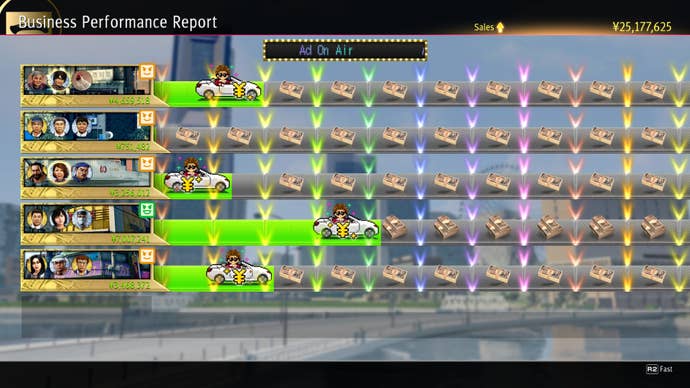
Diversify
Having a diverse portfolio is Business 101. It might be tempting to go all-in on one area, but your gains would be less consistent and you might miss out on some big opportunities for cash growth.
One good example of how diversifying your portfolio helps is the random boosted sales events. Every now and then, a special event will start that sends more consumers than normal towards certain industries. I've found nightclubs and restaurants can benefit from these a lot, and that's a free boost that can pay for property upgrades, new hires, employee training, and more.
Employees also have specializations, so sometimes playing to their strengths will help too. You can match them up using the icons on their employee card, but oftentimes, an employee's speciality will mean they're driven towards certain meters that business chain likes; nightlife and service, for example, or restaurant and renown.
One other place you can make profit, separate from property, is through one-time investments. These are pretty binary decisions: invest and see if it pays off, or don't, but they're usually worth a shot if the cost is low and potential is high. A few thousand yen in the later stages is not that much, and a 200 or 300% payoff is sometimes worth the risk.
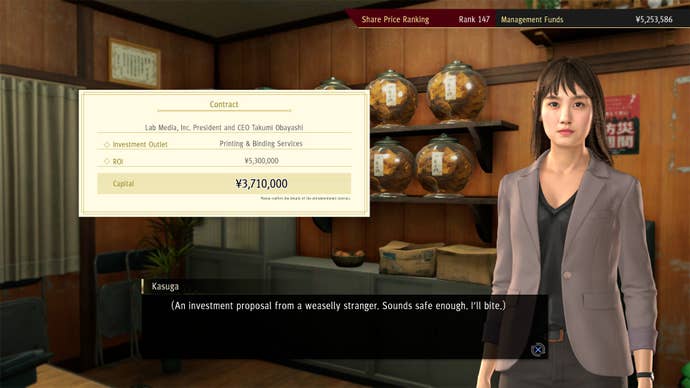
Master Your Shareholder Tactics
Every so often, you'll have to attend a quarterly shareholder meeting. This minigame-within-a-minigame sees you answering to several shareholders, likely irate ones, as to how and why your business is performing a certain way. These meetings are where you make the real money: due to financial laws that Ichiban honorably adheres to, you can't take funds directly out of Ichiban Confections. Do well in a shareholder meeting though, and you might earn a bonus check, and those are all yours for the taking.
The first tip I have for you here: set yourself up for success Before you even start the meeting, make sure your employees are happy, because no matter how annoyed they are for weeks before the meeting, it only counts where they're at when the meeting starts.
Get your A-team lined up for the meeting, too. During the questioning section, each shareholder will berate you with questions about specific areas of the industry; make sure you have a lineup of employees with high charisma and tenacity to counter them. Better yet, identify ones with low command costs, which I'll explain in a moment.
Once you're in the thick of questioning, manage your meter. That big bar at the bottom is how many command points you have, and it costs command to call in your employees to wear down a shareholder's health bar. For every question, you first have to break their actual question, and then pepper them with further retorts to placate them further.
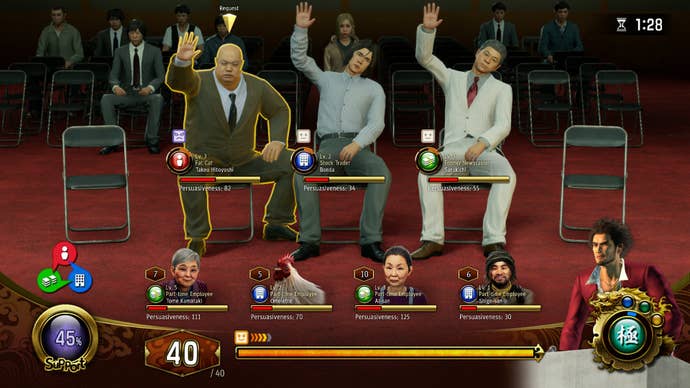
Employees with lower command costs are an immense help here. I found a solid strategy is to use a low-cost reply to break the initial question, then slam them with a high-charisma employee to really damage the health bar. You'll get a feel for it over time. Also, pay attention to the "weapon triangle" of sorts, shown on the left-hand side: some arguments are inherently weaker to responses from another type, so play on that
.Finally, don't forget to apologize. Throughout the questioning phase, Ichiban will have his own bar building up, letting him unleash three different power levels of apology to the shareholders. I've really only used either the level one and three versions; the former is a good stop-gap if I need a breather, and the level three can really do some damage to the whole lineup. Make sure you're using it, because all you lose by making a big apology is a little poise and dignity, and neither of those are reflected in cash payouts.
Put Your Trust in Omelette
I cannot stress this last one enough: Omelette is an MVP. The chicken mascot for Ichiban Confections is one of two employees you gain from the start and cannot ever fire, and she's a juggernaut. Alongside a massive notability boost, Omelette is very useful in shareholder meetings, where her measly five command cost makes her a prime candidate for blasting down remarks.
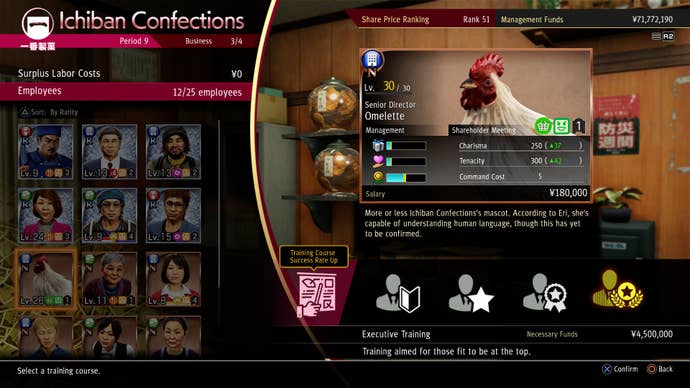
Omelette can also train up pretty fast, and tends to produce well if left alone in the Ichiban Confections store alongside your other mandatory employee. Every so often, you'll also get a random event where a company will pay to feature Omelette in a commercial, which has frequently netted me a stockpile of cash for no extra work. Omelette is the GOAT, and I will never hear otherwise.
Whether you're buying a run-down nightclub and renovating it into a dream property, or flipping a restaurant for short-term profit, the management sim game is one of Yakuza: Like a Dragon's more involved and engaging minigames. It's not the same high-octane activity as say, go-kart racing, but it has its perks.
Mastering it, in my opinion, is absolutely critical. There are some major unlocks hidden away for clearing various tiers of the financial ladder climb, and a later point in the story will require some serious funding that's best acquired through Ichiban Confections. Next to the Battle Tower, the business mini-game is one of the most critical to play through in my opinion. And the story that accompanies Ichiban's rise through the business world is pretty good too, so I think it's worth the pit stop.
Use these tips to fund your next Workshop upgrade, prep for a big boss battle, or just so you can go wild buying some new clothes for your party. And always remember the no. 1 rule in business management: when in doubt, trust in the chicken.
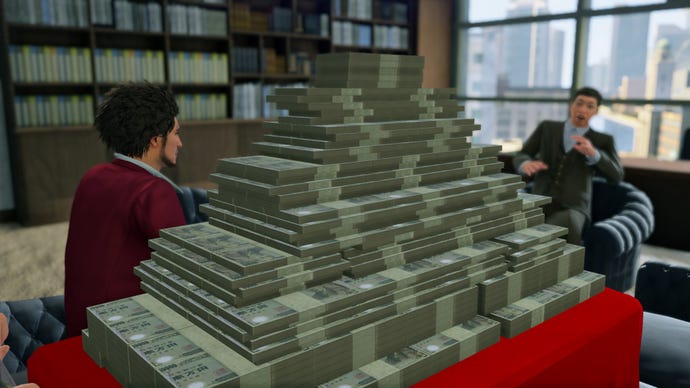




.jpg?width=291&height=164&fit=crop&quality=80&format=jpg&auto=webp)



